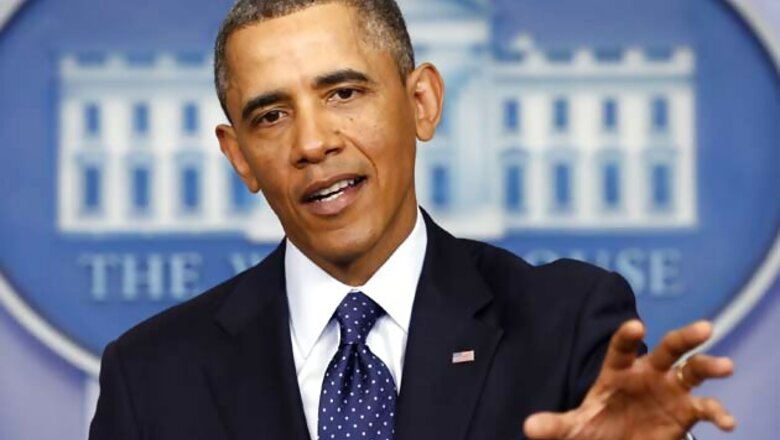
views
Washington: As America re-engages with Iraq and deepens its involvement in the region's web of sectarian conflicts, the Pentagon has made a practical assessment of the brutal job of stabilizing Baghdad: in the future, US forces may be needed on the front lines.
President Barack Obama has ruled out a combat mission, but military officials and former officials say the reality of a protracted campaign in Iraq and possibly Syria may ultimately require greater use of US troops, including tactical air strike spotters or front-line advisers embedded with Iraq forces.
That raises questions over how far Obama can go in the expanding US military power without appearing to violate promises not to drag America into another ground war and highlights different priorities between the White House and Pentagon at the start of what looks to be a long, unpredictable military campaign in Iraq and Syria.
From a military perspective, officials say it makes sense to at least have the option of deploying small numbers of US military advisers alongside Iraqis on the front, time-to-time, even if that appears to contradict Obama's stated policy.
The White House, meanwhile, is keen to signal to US voters that the president who campaigned on ending the war in Iraq will keep this a sharply limited campaign.
Obama has ordered 1,600 soldiers to Iraq since Islamic State fighters swept into the country in June but is seeking to avoid mission creep as he cobbles together an international coalition to "degrade and destroy" the jihadists who want to form of a caliphate in the heart of the Middle East.
American spotters in Iraq, used sparingly, could help avoid civilian casualties as American air strikes pound militants who increasingly might try to hide among innocent Iraqis.
"There's some reports out there that they're already using children and other things to start shielding themselves, because they know that will protect them from air strikes," General Raymond Odierno, chief of staff of the Army, said on Friday.
Odierno says he supports Obama's strategy in Iraq and says properly trained Iraqis can carry out the job. But he also won't rule any options out.
That is a traditional refrain in military circles, one that was made more bluntly by retired General James Mattis, who oversaw American troops in the Middle East until last year.
"You just don't take anything off the table, up front, which apparently the administration has tried to do," Mattis told a hearing held by the House Intelligence Committee on September 18. "We have the most skillful, the fiercest and certainly the most ethical ground forces in the world and I don't think we should reassure the enemy in advance that they'll never face them."
The top US military officer, General Martin Dempsey, ignited the debate this week when he told lawmakers he might recommend sending US troops to accompany Iraqi forces on the front lines of the fight against the hard-line militant group that has taken over much of Iraq and Syria.
"Threats to the United States"
Dempsey also said Obama told him to come to him on a "case-by-case basis" as needed to request use of ground forces in the battle against Islamic State.
"If there are threats to the United States, then I, of course, would go back to the president and make a recommendation that may include the use of US military ground forces," Dempsey said.
Already, military commanders have sought to take steps that test the limits of Obama's willingness in Iraq.
According to Dempsey, General Lloyd Austin, head of US Central Command, recommended sending troops to help US planes locate Islamic State targets near the Mosul dam, a strategic site in northern Iraq. But Obama chose to have US advisors work remotely, officials said.
Officials denied any rift between the two men's vision for the evolving campaign against Islamic State, which they say will include nations from Europe to the Middle East and Australia in an effort to undermine the group's military power, its financing, and support from disaffected Sunni Muslims.
US officials say there is no discussion of sending US ground forces to actually shoot at militants as they did during the previous Iraq war. Instead, Special Operations soldiers could accompany Iraqi forces as they battle Islamic State, to advise them or help guide air strikes.
But current and former officials say the reality of a campaign inside Iraq and possibly Syria may ultimately require an expanded use of American troops, who are now mostly limited to an advisory role far from the battlefield.
Critics say Obama may be painting himself in a corner, at least rhetorically.
"There will be boots on the ground if there's to be any hope of success in the strategy. And I think that by continuing to repeat that, the president, in effect, traps himself," said Obama's former defense secretary, Robert Gates.
In truth, much of this comes down to semantics. In the Afghan and previous Iraq campaigns, the United States has sought to differentiate the roles of military advisors from combat forces that lead the battle against insurgencies there.
"It is hard to connect the dots from an operational standpoint without talking about what ground forces are available and ready to accomplish the mission," said Jessica Lewis, a scholar at the Institute for the Study of War.
"And yet this is a serious political line to cross to suggest that there may be a requirement for some US troops to deploy forward."

















Comments
0 comment